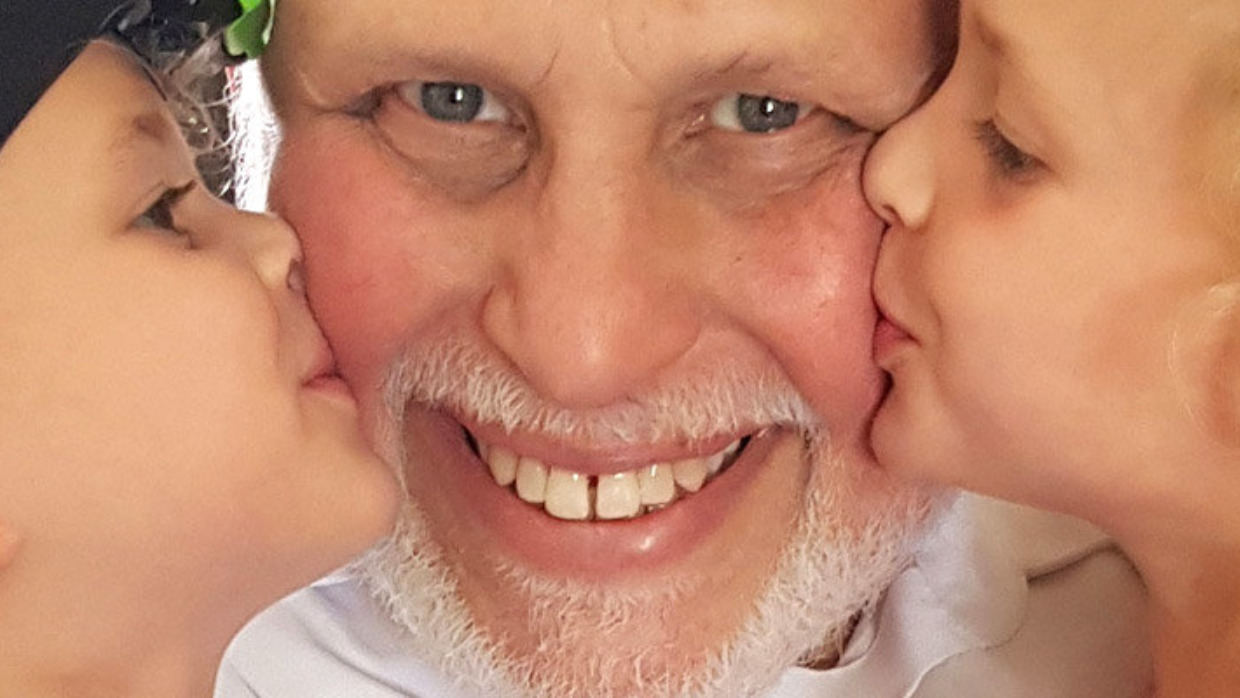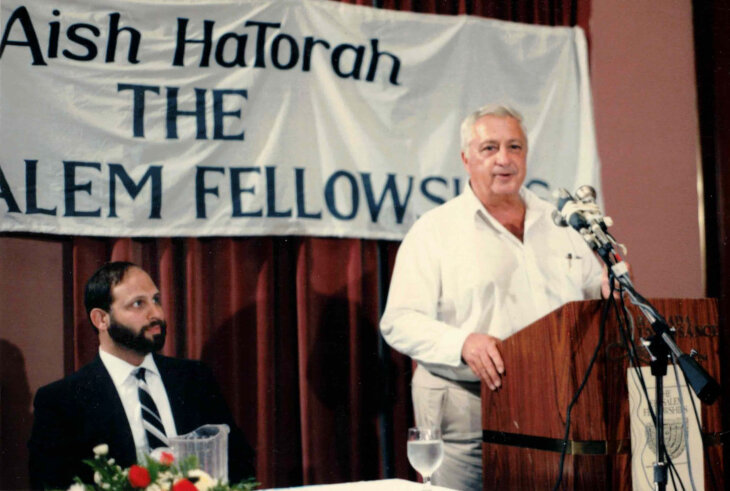 We Were the Lucky Ones
We Were the Lucky Ones


7 min read
Remarkable stories of Rabbi Kalman Packouz, as inspired by Rav Noah Weinberg.
Fifty years ago in Jerusalem, Kalman Packouz met Rabbi Noah Weinberg and became one of Aish HaTorah’s six original students.
Kalman went on to create iconic Jewish initiatives including the first viral newsletter in Jewish history (Shabbat Shalom), the first Aish HaTorah branch (St. Louis) and the Western Wall webcam. Along the way, Kalman raised $15 million to fund Jewish educational programs.
 Kalman Packouz with former Israeli Prime Minister Ariel Sharon
Kalman Packouz with former Israeli Prime Minister Ariel Sharon
Kalman, who passed away in 2019, is the subject of a new book, Thumbs Up!, that combines the teachings of Rabbi Weinberg, with heartwarming true stories of Kalman’s adventures. Some excerpts:
One day, Kalman parked his car in Jerusalem’s Ramat Eshkol shopping center. He returned to find the car’s right side scraped from end to end. Spotting a note under the windshield wiper, Kalman was pleased that the driver had not just driven off. He opened the note to read, “I observed a woman in a black Mercedes, license plate #123-456, sideswipe your car and drive off. I am willing to testify to the police or in court.” Signed was a name and phone number.
Kalman went to the police and, with the license plate number, obtained the woman’s name and address. On the way, Kalman was reminded of the Mishnah: "Judge every person favorably.” Refraining from accusations, he went through a checklist of possibilities:
Upon arriving at the woman’s home, Kalman introduced himself and explained the purpose of his visit.
“It wasn’t me who hit your car!” the woman shouted.
Kalman took a deep breath and reminded himself: Don’t escalate a quarrel, nor answer every insult. “Are there any other female drivers in your household?” he said.
“No.”
“Okay, have it your way,” Kalman said. “I’m going to file a police report. Minimally, you’ll lose your license. And there’s the possibility of a large fine and jail sentence.”
The woman went berserk. “That’s unfair! Last month someone sideswiped my car and didn’t leave a note. Why should I leave a note?”
Kalman was taken aback by the psychological linkage that made him the unfair object of revenge. Yet he avoided the urge to respond, focusing instead on the words of King Solomon: “A master of temper is stronger than one who captures a city.”
As the woman continued to rage, Kalman dutifully nodded, maintained eye contact and made intermittent listening sounds. Eventually she ran out of steam, but not before unleashing one final invective: “It’s all your fault for parking so close to the white line!”
As Kalman drove home, he was left to ponder: Why was I subjected to this person’s extreme frustration, obstinacy and verbal abuse? Am I culpable in some way? What lesson does the Almighty want me to learn from this incident?
Kalman concluded: “This taught me that people, including myself, often don’t see their own faults and mistakes. As a rabbi, this is a good lesson in dealing with people.”
Kalman filed a police report. In the ensuing weeks, the woman repeatedly phoned Kalman, screaming and threatening. She also had her friends call, pressuring Kalman to cancel the police report.
Finally, the woman agreed to pay. They met at the police station, where she handed Kalman an envelope with cash.
Kalman counted the money, then said, “There seems to be a mistake.”
Her barrage came like a rocket blasting off. “I know your type! You’ve got me over a barrel and now want to extort more money! Who do you think you are? I’m not going to pay!”
Eventually, the propellant petered out and the litany stopped.
“Actually, you gave me too much,” Kalman said softly, handing her a hundred-shekel note, which she took without a hint of remorse or embarrassment.
Kalman then inquired about the person who had sideswiped her car.
“I was able to track them down, but it’s so frustrating,” she said. “They’re unwilling to take responsibility and pay for the damage. Some people can be so cheeky!”
In retrospect, Kalman wondered on what basis he merited that a witness left a note. He then recalled that a few weeks earlier while riding a public bus, the driver had sideswiped a car and continued on. Kalman had gotten off at the next stop and left a nearly identical note on the windshield.
Kalman smiled and thought, The Almighty repays, measure for measure.
Kalman viewed fundraising not as an act of taking, but as giving donors the opportunity to partner in a noble cause and earn eternal merit. “I’m presenting an opportunity to become involved in humanity’s most noble cause: connecting Jews to their heritage,” he explained.
In Miami, Kalman was meeting a supporter for lunch. After catching up on each other’s lives and discussing the state of the Jewish people, Kalman requested a renewal of the donor’s $2,000 annual support.
“My current income precludes giving that amount,” the donor said. “But I can give $500.”
 A street in Pennsylvania is named for Kalman Packouz
A street in Pennsylvania is named for Kalman Packouz
Kalman didn’t give up easily. He graciously thanked the donor for continued support, then said, “The great twentieth century sage, the Chofetz Chaim, offers advice for how to succeed in any financial or commercial enterprise. Before entering a venture, estimate your projected profit. Then write a check for ten percent of that amount and set it aside, to eventually be given as tzedakah. Then say, ‘Master of the Universe, it is my privilege to invite You to be my partner in this endeavor. If I fail to realize a profit, I will have nothing to share with You, my partner. However, if I gain the anticipated profit, then the ten percent I’ve set aside is Yours.’”
Kalman paused, then asked the supporter: “How much income would you need in the coming year to enable a donation of the full $2,000?”
“Hmmm,” the donor said, doing a quick mental calculation. “I'd need to double my annual earnings.”
“Great!” Kalman said. “Then we have a deal. Please let me know if you make that amount in the coming year.”
Over the course of the year, Kalman tried valiantly to maintain contact with the donor – via phone calls, emails, and sending packages of interesting information and books. The response was deafening silence.
At the end of the year, Kalman wrote to inquire about the status of their deal. Zero response.
A few months later, the donor’s secretary called Kalman to schedule a lunch meeting. Why would he want to meet after ignoring me an entire year? Kalman asked himself. He probably wants pastoral guidance for a personal problem.
A few days later, the two met for an enjoyable lunch, filled with pleasant small talk. Toward the end of meal, the man asked, “Do you remember our financial deal?”
“Yes,” Kalman said poker-faced, but anxious to see where this was headed.
“Well, Rabbi, you won’t believe it. After we made the deal, my phone rang off the hook with more business than I could even handle. In the past year, my earnings didn't double – they tripled. I made more money than I ever imagined!”
“That’s wonderful!” Kalman enthused. “But why did you avoid contacting me until now?”
“Because I was skeptical whether this bonanza was the result of our agreement, or mere coincidence. So I decided to wait and see what happens next. It turns out that the first quarter of this year has been a financial disaster. My worst ever! That’s when I knew it was a mistake not to have made good on my pledge.”
The donor handed Kalman a check, then added hopefully, “Rabbi, could we make the same deal for next year?”
Kalman chuckled. “Just tell me how much and I’ll try to arrange it!”
Thumbs Up! is available on Amazon.com and in Jewish bookstores worldwide.

I had the great privilege to be one of Kalman's early students in the St. Louis Aish HaTorah Program. What a splendid, exemplary man he was. Am looking for ward reading THUMBS UP! Steven Finer
I couldn't put it down! I never felt so uplifted, both by the life of Rav Kalman and the stories about Rav Noah. A must read
WONDERFUL!